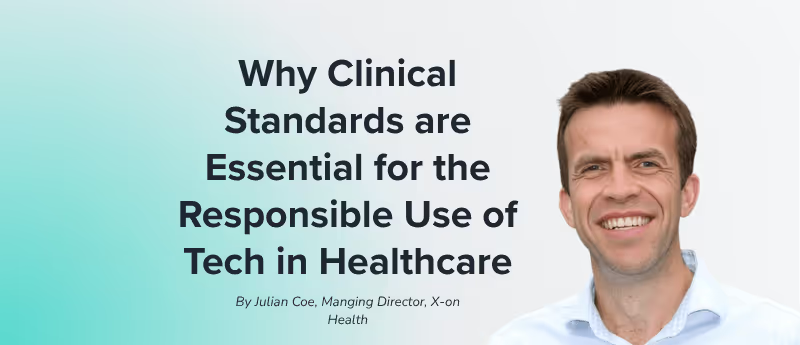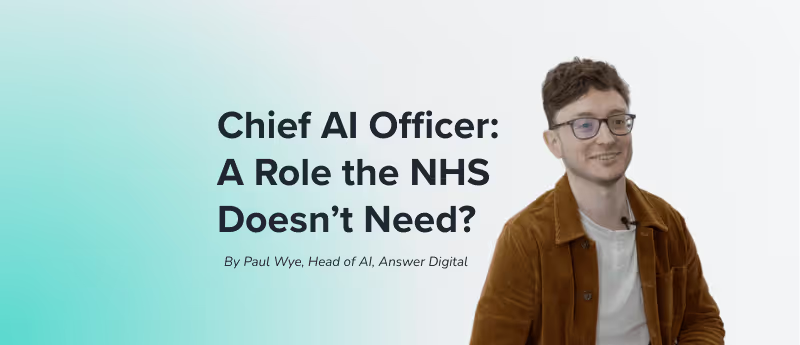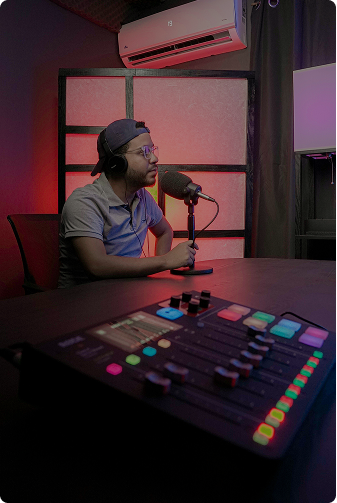From reactive to proactive transforming physiotherapy with AI
From reactive to proactive transforming physiotherapy with AI
.png)
In this interview, we speak with Peter Grinbergs (Co-founder of EQL; London, UK) about how AI can transform physiotherapy from a reactive service into a proactive experience. Peter discusses EQL’s digital musculoskeletal triage support tool, Phio, which supports patients with self-management tools 24/7, to enable rapid access to the best available care.
Please could you provide a brief overview of your career to date?
I started my career as a physiotherapist working in Premiership football (UK). I did not know it at the time, but looking back it was such a privileged environment to work in from a healthcare delivery perspective. There are no delays or financial restrictions. Everyone is motivated and as such it is really easy to guarantee outputs from a recovery perspective. This is why you often hear clubs saying things like “x player will be back on the pitch in 28 days”. I went on to found two healthcare businesses; one was a nationwide physiotherapy business (Physio 1st; UK) with 40 clinical locations, and the other was a national rehabilitation agency that sourced diagnostics, surgery and rehabilitation for the legal and insurance sectors.
You started off as a sports physiotherapist for professional football, what inspired you to move into digital physiotherapy?
I had always been interested in the application of technology and data in healthcare. At Birmingham City Football Club (UK), we used to review player statistics and use various technology-based screening systems when evaluating player fitness. However, most of these solutions were aimed at helping clinicians manage their patients better. I was really interested in seeing if there was a way to offer this benefit directly to patients without needing to rely so heavily on clinicians as intermediaries.
Could you tell us a bit about why you founded EQL?
There are a lot of issues with the way healthcare is typically delivered here in the UK. It takes too long to get in front of the right healthcare professional, and no one tells you about the things you could be doing to help yourself during the waiting period. My view is that, right now, healthcare is too much of a reactive service rather than the proactive experience it should be. This makes for a bad patient experience and poor outcomes. The vision behind EQL (London, UK) is to change this status quo.
What is Phio and how does it work?
Phio is a product from EQL that improves health outcomes for people with muscle and joint problems by providing self-service assessment and management tools that enable rapid access to the best available care. Using our digital conversation tool, Phio Access, patients can be quickly and safely signposted to the most appropriate care setting, 24/7, 365 days a year. For a patient, this means they can get an immediate understanding of how urgent their condition is, whether they need to see a physiotherapist face-to- face, or whether a personalized, exercise-based rehabilitation program could help reduce their pain straight away. We work in partnership with organizations including the NHS and private medical insurers to deliver easy and unrestricted access to Phio for patients.
What opportunities does Phio offer that face-to-face interaction with a physiotherapist does not?
70% of general practitioners recommend self-management for musculoskeletal issues. Phio gives you access to this straight away, and there is no need to see anyone or travel for an appointment. Over 90% of our patients opt for self-management and most have started their exercises within 24 hours. 50% record a reduction in pain within the first 2 weeks of their treatment, and if you consider that the current waiting time for an NHS physio can range from 4 to 36 weeks, most can be out of pain and back doing the things they love within the time they might have been waiting for an appointment. Also, lots of people do not want to travel unnecessarily for face-to-face appointments if they can access on-demand care in the comfort of their own home.
How do you overcome traditional challenges of introducing a digital tool into healthcare, including data protection, clinician trust, lack of human empathy, and access inequalities?
This is a really good point and there are a few factors involved in my opinion. First, I think it is important to not be ideological about digital pathways in healthcare. We follow a ‘getting it right first time’ approach, meaning that if digital is not a good option for you, we are not going to force you down that pathway. As an example, we always give people a choice over whether they proceed down a digital pathway or not. To some extent this helps us manage the trust element, as those people who chose to proceed with a digital pathway are expecting and accepting of it right from the start. We also follow a blended approach, meaning a human is always in the loop somewhere. Our patients can actually chat directly with a physio from within our app so they can receive advice and support that is relevant to their own recovery. Regarding equity and inclusion, what we actually see is a higher uptake from those groups who typically are underserved by traditional healthcare services. This is evident in the data, where what we actually see is an over representation of minority groups.
What is your vision for EQL in 5 years? And if you could pick one thing, what would you most like to achieve?
EQL is on a mission to help everyone heal smarter. We have come a long way since we started, helping over half a million people access the best care for them, when and where they need it. We recognize that modern life can be a pain in the neck, literally! We have started to move the dial on providing quick access to the right care, but what we are really striving for is to change healthcare from being a purely reactive service for some to something that is a proactive experience for all. By this I mean finding ways to engage people in preventative measures long before they become reliant on an increasingly overburdened healthcare system. To this end, we invest heavily in technology and place ourselves at the very forefront of research and innovation. We are committed to driving the industry forward through our continued links with academia and via initiatives such as our AI 4 MSK Health topic group work with the World Health Organization. We also recently graduated from Google’s Growth Academy: AI for Health. This accelerator program was designed to support 30 of the world's most groundbreaking health tech companies who are looking to use technology to change the world of healthcare. There is still a lot to be done, but I think it is a really exciting time to be in this space and to be participating in a global transformation towards equitable access to healthcare. Watch this space!
Interviewee profile:

EQL (London, UK) co-founder and Chief Medical Officer, Peter Grinbergs; former Premier League Physiotherapist and serial entrepreneur with two previous successful healthcare businesses. Peter is the founder of the WHO topic group “AI for MSK Health” and considered to be a thought leader in the digital health space, having pioneered “Phio” a novel and award winning digital musculoskeletal triage and treatment solution. Disclaimers:The opinions expressed in this feature are those of the interviewee and do not necessarily reflect the views of Future Medicine AI Hub or Future Science Group.
.png)
.png)
.png)



